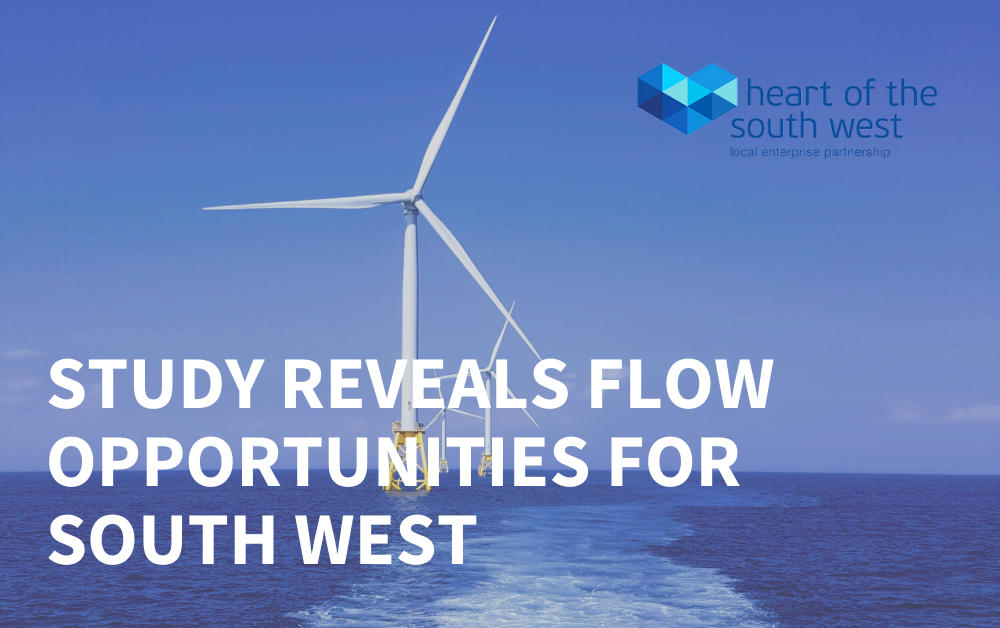A new report has revealed how the opportunities from developing Floating Offshore Wind (FLOW) in the Celtic Sea can be maximised.
The report was commissioned by Heart of the South West LEP and co-funded by Devon County Council, North Devon Council and Torridge District Council. The research, carried out by Regen, assessed the economic opportunities FLOW presents for Devon and Somerset, as well as the wider UK.
FLOW allows the deployment of wind turbines in locations with higher wind potential, opening up alternate opportunities for development. The Celtic Sea was previously overlooked for fixed offshore wind development due to the seabeds depths, however, FLOW has reignited the opportunity for large scale offshore renewable energy generation in the South West.
The report highlights how the Heart of the South West can play a key role in the Government’s target of meeting 60% of the offshore wind supply chain from within the UK by 2030, drawing on its considerable strengths.
The report also reveals that FLOW in the Celtic Sea represents a significant long-term opportunity for the region, because the skills needed in the supply chain are transferable between marine engineering and offshore renewable energy sector applications.
Grace Millman, Energy Analyst at Regen, said: “In order for the UK to transition to a net zero energy system, the deployment of large-scale renewable energy infrastructure, such as floating offshore wind, is critical. Floating offshore wind in the Celtic Sea presents a significant economic opportunity for the South West, especially given our core strengths in marine technologies, engineering, research and innovation”.
The report builds on work previously done by the Offshore Renewable Energy Catapult that estimated FLOW in the Celtic Sea could bolster the region’s economy by providing 3,000 jobs and £682m in supply chain opportunities across the South West and Wales.
Karl Tucker, Chair of the Heart of the South West LEP, said: “The Heart of the South West is a flourishing natural powerhouse, already home to the 3.2GW nuclear power plant Hinkley Point C and 1.8GWs of onshore renewable energy. The report’s findings highlight how the region can continue to develop its clean growth journey through FLOW, boosting the region’s role as the country’s greenest region.”
“It also confirms that the opportunity from FLOW will be best realised if the region collaborates, so a joined-up approach is now needed between universities and other academic institutions, the maritime sector, local businesses and public sector bodies such as the LEP and local authorities.”
Mel Sealey, Senior Manager of Strategic Intelligence and Economic Infrastructure at Devon County Council, said: “The supply chain development involved with FLOW offers real potential to support Devon-based companies already working in offshore wind or parallel sectors.
“For example, Plymouth’s marine cluster and Oceansgate are in an advantageous position to utilise the innovation and connectivity opportunities the project presents. Developing FLOW in the Celtic Sea will not only benefit the local supply chain and businesses, but also lead to more, high-value jobs, and the development of future-proof skills.
Bob Hicks, Lead Member for the Economy at Torridge District Council, said: “The FLOW project out in the Celtic Sea opens doors for existing facilities and industry in North Devon, such as the continued role of Appledore as a centre for vessel design and marine engineering. We are looking forward to working with partners to realise the potential economic, supply chain, and job benefits of the project, as we work to promote the South West as a leader in clean growth.”
Dominie Dunbrook, Senior Economic Development Officer at North Devon Council, said: “It’s fantastic to see the opportunities Devon and Somerset present for offshore wind developments.
“By harnessing the facilities and capabilities based in the region, we can play a significant role in the UK’s journey to net zero, whilst bringing wider economic benefits to businesses and residents.”
Alongside the benefits the project will bring to the region, the report outlines challenges surrounding grid connectivity, supply chain development, and data and spatial planning. It also sets out several recommendations including starting a supply chain development programme and leveraging Hinkley Point C, supporting the development of Appledore as a centre for marine technology, positioning Plymouth and Oceansgate as a key inward investment opportunity, developing the required skills across the Heart of the South West, and encouraging research, development and innovation through the Universities of Exeter and Plymouth.
Download the full report here.


